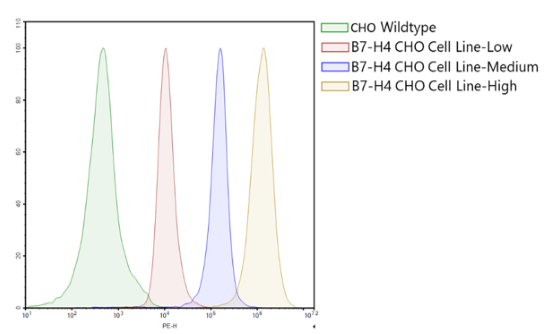B7-H4 CHO Cell Line (Low, Medium or High Expression)
B7-H4 CHO Cell line is a recombinant clonal stable CHO-K1 cell line constitutively expressing full length human B7- H4 protein, also known as V-set domain-containing T-cell activation inhibitor 1 (VTCN1); (NM_024626.4). Surface expression of B7-H4 was confirmed by flow cytometry. Each stable clonal cell line was selected for different levels of B7-H4 expression (Low, Medium and High), to mimic different B7-H4 expression levels in various cancer types.
Purchase of this cell line is for research purposes only; commercial use requires a separate license. View the full terms and conditions.
| Name | Ordering Information |
| Thaw Medium 3 | BPS Bioscience #60186 |
| Growth Medium 3B | BPS Bioscience #79529 |
The cell line has been screened to confirm the absence of Mycoplasma species.
B7-H4 is an immune checkpoint that belongs to the B7 family and is encoded by the VTCN1 gene. B7-H4 is expressed on the surface of antigen presenting cells, interacting with currently unidentified ligands to negatively regulate immune cell responses and suppress tumor-associated immunity. B7-H4 also contributes to changes in the tumor microenvironment that benefit cancer cells and support their proliferation, survival, invasion, and metastasis. B7-H4 is highly expressed in some cancer cells, and has been correlated with tumor progression, particularly in ovarian and breast cancer, making it an attractive target for immunotherapy.


